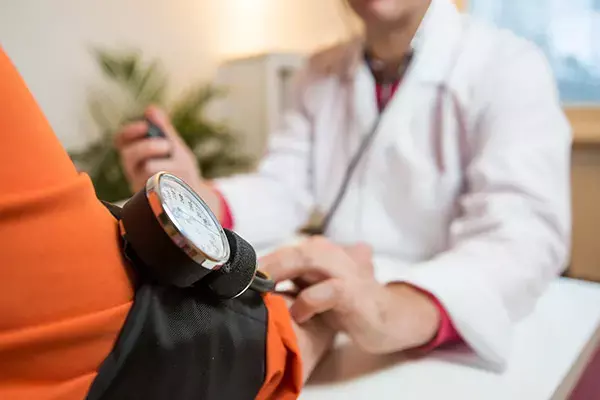- Home
- Medical news & Guidelines
- Anesthesiology
- Cardiology and CTVS
- Critical Care
- Dentistry
- Dermatology
- Diabetes and Endocrinology
- ENT
- Gastroenterology
- Medicine
- Nephrology
- Neurology
- Obstretics-Gynaecology
- Oncology
- Ophthalmology
- Orthopaedics
- Pediatrics-Neonatology
- Psychiatry
- Pulmonology
- Radiology
- Surgery
- Urology
- Laboratory Medicine
- Diet
- Nursing
- Paramedical
- Physiotherapy
- Health news
- Fact Check
- Bone Health Fact Check
- Brain Health Fact Check
- Cancer Related Fact Check
- Child Care Fact Check
- Dental and oral health fact check
- Diabetes and metabolic health fact check
- Diet and Nutrition Fact Check
- Eye and ENT Care Fact Check
- Fitness fact check
- Gut health fact check
- Heart health fact check
- Kidney health fact check
- Medical education fact check
- Men's health fact check
- Respiratory fact check
- Skin and hair care fact check
- Vaccine and Immunization fact check
- Women's health fact check
- AYUSH
- State News
- Andaman and Nicobar Islands
- Andhra Pradesh
- Arunachal Pradesh
- Assam
- Bihar
- Chandigarh
- Chattisgarh
- Dadra and Nagar Haveli
- Daman and Diu
- Delhi
- Goa
- Gujarat
- Haryana
- Himachal Pradesh
- Jammu & Kashmir
- Jharkhand
- Karnataka
- Kerala
- Ladakh
- Lakshadweep
- Madhya Pradesh
- Maharashtra
- Manipur
- Meghalaya
- Mizoram
- Nagaland
- Odisha
- Puducherry
- Punjab
- Rajasthan
- Sikkim
- Tamil Nadu
- Telangana
- Tripura
- Uttar Pradesh
- Uttrakhand
- West Bengal
- Medical Education
- Industry
KDIGO updates Guideline on BP management in patients with chronic kidney disease

Delhi: The Kidney Disease: Improving Global Outcomes (KDIGO) organization has released the latest clinical practice guideline for the management of blood pressure (BP) in patients with chronic kidney disease (CKD) who are not receiving dialysis.
The guideline, published in the journal Annals of Internal Medicine, is an update to 2012 recommendations on the same topic and reflect new evidence on the risks and benefits of BP-lowering therapy among patients with CKD.
The updated guideline comprises 11 recommendations and 20 practice points and focuses on which BP to target and how to measure it in patients with CKD.
The risks for cardiovascular disease and death are greater than the risk for kidney failure in most individuals living with CKD. Recognizing the importance of CKD as a risk factor for both high BP and cardiovascular disease, recent randomized controlled trials have systematically recruited larger subgroups with CKD to address the efficacy and safety of intensive BP lowering in this key subgroup.
Based on the evidence, the Work Group recommends targeting a systolic BP of less than 120mm Hg measured by a standardized technique in the office. Standardized BP was recommended because of concerns that a routine office BP would lead to inaccuracy in the measurement of BP and potentially over-treatment. For this reason, the KDIGO 2021 BP guideline makes detailed and strong recommendations regarding standardized BP measurement, and the target systolic BP of less than 120 mm Hg should only be applied when standardized BP measurements are used. The KDIGO 2021 BP guideline adopts a target systolic BP of less than 120 mm Hg for persons with CKD because of the benefits of intensive BP control on cardiovascular and all-cause mortality. The effects of intensive BP control on the risk for CKD progression are less certain.
Main recommendations-
1.Patients with chronic kidney disease (CKD) not receiving dialysis should have a goal for a systolic blood pressure below 120 mm Hg as measured in the office using a standardized technique.
2.The Work Group also suggests that out-of-office blood pressure measurements (ambulatory or home blood pressure monitoring) be used to complement standardized office readings for management of hypertension.
3.The guideline discusses starting renin-angiotensin system inhibitors (an angiotensin-converting enzyme inhibitor or angiotensin-receptor blocker) in people with hypertension and CKD, recommending the therapy in those without diabetes but with severely increased albuminuria and those with diabetes and moderately to severely increased albuminuria, and suggesting it in those without diabetes but with moderately increased albuminuria.
4. Avoid any combination of angiotensin-converting enzyme inhibitor, angiotensin-receptor blocker, and direct renin inhibitor therapy in patients with CKD with or without diabetes.
5 It is suggested that a target sodium intake of less than 2 g/d in patients with hypertension and CKD.
6. Patients are advised to undertake moderate-intensity physical activity for a cumulative duration of at least 150 min/wk or to a level that is compatible with their cardiovascular and physical tolerance.
The authors conclude that there may be certain subpopulations in CKD where the evidence to support the SBP target of less than 120 mm Hg is less well developed, and hence the risk–benefit tradeoffs are less certain.
Reference:
1) The full clinical guidelines can be accessed at https://kdigo.org/guidelines/diabetes-ckd.
2) Diabetes Management in Chronic Kidney Disease: Synopsis of the 2020 KDIGO Clinical Practice Guideline published in the Annals of Internal Medicine.
DOI: https://kdigo.org/wp-content/uploads/2018/03/Annals-Diabetes-Synopsis.pdf
Dr Kamal Kant Kohli-MBBS, DTCD- a chest specialist with more than 30 years of practice and a flair for writing clinical articles, Dr Kamal Kant Kohli joined Medical Dialogues as a Chief Editor of Medical News. Besides writing articles, as an editor, he proofreads and verifies all the medical content published on Medical Dialogues including those coming from journals, studies,medical conferences,guidelines etc. Email: drkohli@medicaldialogues.in. Contact no. 011-43720751


